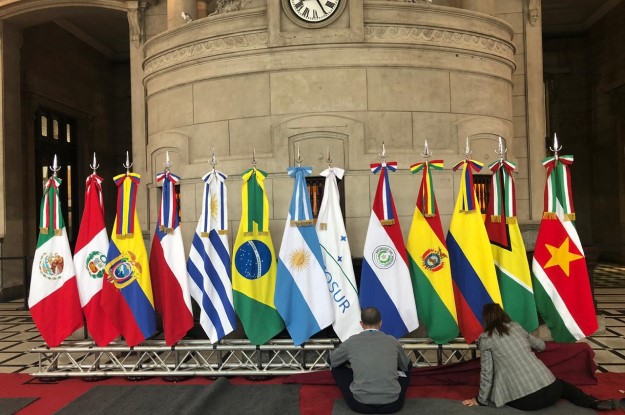For Brazil, the most promising part of Mercosur’s announcement of a trade deal with the European Union is that it would give the country a path – with or without its regional partners – to implement comprehensive reforms and open its economy to global trade.
It’s an unexpected opportunity that President Jair Bolsonaro should take care not to squander.
An acrimonious 20-year negotiation process made it seem as though the accord would never happen at all. Indeed, the announcement that a deal had been reached took most experts by surprise. Trade negotiations naturally face challenges, but when it came to Mercosur and the EU, the stalemate was especially hard to break. While the EU is open to trade but protective mostly of its agricultural products (exactly the sector where Mercosur can boast its comparative advantage), Mercosur brings together some of the most closed markets for manufactured goods. These were not conditions for an easy deal.
But several factors made the agreement possible. First were the political conditions in Mercosur’s two dominant economies. In Brazil, Bolsonaro has a far more favorable stance towards trade liberalization than did his predecessors. In Argentina, President Mauricio Macri is running for re-election and is keen to show results in trade and foreign policy. The Mercosur bloc also improved its liberalization offers, and on the EU side the impending end of the European Commission’s term in office and its desire to counter rising protectionism in the United States played an important role.
The broad outlines of the deal suggest important benefits for both sides. In exchange for the opening of its closed regional market to 91% of the European Union’s exported goods, Mercosur gained full liberalization for 95% of its goods in EU markets. While the EU already had a relatively open economic environment, for the South American bloc this is a de facto opening to foreign trade, given the current level of protectionism in the region. The changes for Europe will be limited at first, since Mercosur’s agricultural products will be subject to quotas and most of its manufactured products already have low tariffs.
Other elements of the deal, such as commitments to stay in the Paris climate accord and agreements on rules of origin and the services sector, will similarly require more significant changes for Mercosur than for the EU.
The agreement is still being revised, and there remain some possible points of contention. For example, the two sides seem to have different interpretations of the “principle of precaution,” which refers to the right of a country to impose barriers to imports that may harm health or the environment, even in the absence of scientific evidence. This has been a contentious issue since the beginning of the negotiation, with the Europeans seeing a much wider scope to invoke it.
Still, the agreement appears well on its way to becoming a reality. Mercosur is now entering the world of modern and ambitious preferential trade deals. And they are starting with a very important partner. For Mercosur as a whole, this is a positive step. And for Brazil, it has the potential to be transformational.
That’s because, beyond eliminating import tariffs for 91% of EU products, the agreement should help Brazil modernize its regulatory framework and its institutions – and not only those related to trade. The effort to upgrade Brazil’s institutional framework will impact diverse areas of its economy, from public procurement, competition policy, the enforcement of technical standards and sanitary norms, intellectual property protection, compliance with environmental and labor international treaties, and more.
Implementation will take time. It should take around three years until the agreement has gone through all necessary steps and the final ratification by multiple bodies, including all of Mercosur members’ parliaments, takes place. After that, the implementation of the negotiated commitments will take another 15 years to take full effect.
But the Brazilian economy doesn’t have to wait this long to benefit from the positive effects of trade liberalization on productivity and competitiveness. Brazil’s trade policy can proceed in two parallel tracks: unilateral reforms to liberalize trade, and the negotiation of similar deals with other relevant partners. Many analysts used to say reforms towards unilateral liberalization would endanger the negotiations with the EU. Now, the deal is signed. No more excuses.
—
Polónia Rios and Motta Veiga are directors of the Center for Studies in Integration and Development (Centro de Estudos de Integração e Desenvolvimento)








